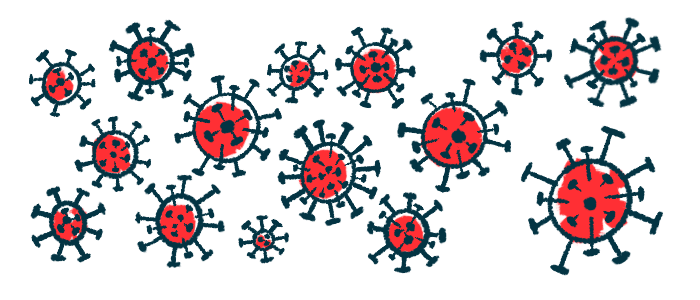Genetic analysis links cold sores, shingles to NMOSD
Herpes simplex and varicella-zoster viruses may cause NMOSD, study finds

Genetic variations linked with cold sores and shingles infections have been associated with the development of AQP4 antibody-positive neuromyelitis optica spectrum disorder (NMOSD), according to genetic analysis.
The findings suggest that the herpes simplex virus, which is the cause of cold sores, and the varicella-zoster virus, which leads to shingles, may cause NMOSD, the researchers concluded.
The study, “Causal associations between prodromal infection and neuromyelitis optica spectrum disorder: A Mendelian randomization study,” was published in the European Journal of Neurology.
NMOSD is a chronic autoimmune disorder mainly characterized by inflammation of the optic nerve, which connects the eyes to the brain and the spinal cord. In most cases, the inflammatory attack is associated with the presence of antibodies targeting aquaporin-4 (AQP4), a protein present in neuron-supporting cells called astrocytes.
Emerging evidence suggests that previous infections may stimulate the mistaken immune response in NMOSD, but it remains unclear which type of infection may trigger NMOSD.
Researchers in China explored the causal associations between NMOSD and four herpesvirus infections, namely chickenpox and shingles (caused by varicella-zoster), cold sores (caused by herpes simplex), and mononucleosis (associated with Epstein-Barr virus infection), as well as a host of other microbes.
Data from a genome-wide association study
Data from a genome-wide association study (GWAS), from the genetic testing company 23andMe, were used. GWASs are studies designed to identify single changes in DNA — called single-nucleotide polymorphisms (SNPs) — that are associated with either an increased or decreased risk for a given disease based on their frequency in people with that disease versus others without.
The team examined GWAS data from 215 NMOSD patients of European ancestry and 1,244 unaffected controls. Among the patients, 132 tested positive for anti-AQP4 antibodies, while 83 tested negative. Participants completed a self-reported questionnaire regarding their history of infections, which had been confirmed by a clinician or a blood test.
In NMOSD patients, researchers identified one SNP associated with chickenpox (rs9266089 in the HLA-B gene), one for cold sores (rs885950 in the POU5F1 gene), and one for mononucleosis (rs2596465 in the HCP5 gene). Additionally, three SNPs were identified for shingles (rs2523591 in the HLA-B gene, rs7047299 in the IFNA21 gene, and rs9260809 in the MICD gene).
The data was analyzed for potential cause-and-effect relationships between the infections and NMOSD. The team used a method called Mendelian randomization, which avoids reverse causality — or finding associations in which it’s NMOSD that leads to infections — and other factors that may influence the relationship between infections and NMOSD.
Associations with anti-AQP4 antibodies
Analysis revealed significant associations between cold sores, shingles, and NMOSD patients who tested positive for anti-AQP4 antibodies. No significant association was found between chickenpox or mononucleosis with AQP4-NMOSD.
Also, none of the SNPs linked to all four infections reached statistical significance for patients who did not carry AQP4 antibodies.
Regarding other infections, one SNP (rs9268652 in the HLA-DRA gene) was identified from hepatitis B that was associated with AQP4-NMOSD, but it reached statistical significance only before adjustments for multiple comparisons. Another SNP (rs3093956) was identified from pneumonia and also was significant for AQP4-NMOSD.
No significant associations were found between the other infections and AQP4-positive or negative NMOSD.
“These findings suggest there are positive associations between cold sores and shingles and AQP4-ab-positive NMOSD, indicating there may be causal links between herpes simplex virus and varicella-zoster virus infection and AQP4-ab-positive NMOSD,” the researchers concluded.
“Further elucidation [explanation] of the causality could provide insight into the potential biological roles of cold sores and shingles in the pathogenesis [development] of AQP4-ab-positive NMOSD,” the researchers suggested.
The team also noted these results “require further validation in patients with different ancestry.”






